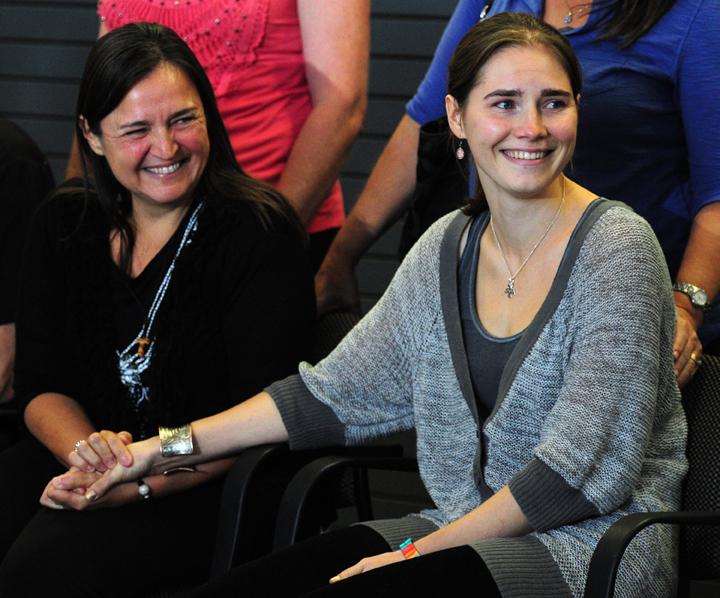Knox has been acquitted after five years of trials
Amanda Knox, right, holds the hand of her mother Edda Mellas after arriving at Sea-Tac International Airport Tuesday, October 4, 2011, in Seattle, Washington. Knox was acquitted of murdering her roommate in Italy. (John Lok/Seattle Times/MCT)
May 6, 2015
After enduring two trials spanning eight years and three countries, 27-year-old American exchange student Amanda Knox, along with Italian ex-boyfriend Raffaele Sollecito, were acquitted of the murder of their 21-year-old English roommate Meredith Kercher, who was killed in her apartment in Italy in November 2007. Rudy Guede, an acquaintance of the group, is still charged with her murder and is serving his prison sentence.
“I’m still absorbing the present moment which is full of joy,” Knox said.
The two were acquitted by Italy’s highest criminal court on March 27, after having spent nearly five years in Italian prison.
Their trial began in 2009, and Knox, Sollecito, and a former roommate named Rudy Guede were charged with murder and sentenced to 26, 25, and 16 years in prison, respectively. All three appealed their cases, and prosecutors found that forensic evidence against Knox and Sollecito was flawed; the two were acquitted in March 2013, but were tried again in March 2014 and found guilty a second time. Finally, a second appeal took place and the two were acquitted a second time and the case closed for good.
Knox was able to return to the U.S. in 2011 though her trial continued, and currently resides in Seattle, working as a freelance journalist. Knox is simply “grateful to have her life back.”
Sollecito, also acquitted, is “happy and incredulous” about the final ruling.
The legal fiasco began in November 2007, when Knox reported to Italian police that she found Kercher dead in her bedroom after Knox returned from spending the night at Sollecito’s apartment. Signs of a staged burglary were present. Knox, her then boyfriend Sollecito, and Guede were arrested as the only suspects of the murder.
The three were questioned over a period of four days. All three were reported to have changed their stories, although Guede’s did not remotely match the others’. He first stated Knox was not present, then later said she was. He also stated that while visiting Kercher that night, after using the bathroom, he returned and saw Kercher on the floor, while a “dark figure” escaped through the window.
After serving a portion of their sentences, Knox and Sollecito were given a trial. During the first trial, Italian prosecutors and police made several mistakes and biased assumptions about the two suspects. No DNA from either suspect was found on Kercher’s body, belongings, or in her bedroom; police claimed Knox and Sollecito had somehow wiped away all forensic evidence. Several pieces of evidence had been neglected or tampered with, including the suspects’ computer hard drives, which were accidentally overridden by police.
The two were convicted and sentenced, but later appealed and were given a second trial regarding confusion over the murder weapon. In 2014, Knox and Sollecito were found guilty, but acquitted by the highest Court of Cassation in March 2015.
Guede received a separate trial, and his sentence was eventually reduced from 30 to 16 years. Several DNA samples from Guede, including skin cells and his handprint in blood on Kercher’s pillow, were found at the scene, though prosecutors decided there was no burglary, and reduced his sentence.
Knox, grateful of her many supporters, believes she was wrongly accused and incriminated by Italian investigators, and wants to end such unjust practices.
“Countless other wrongfully convicted persons do not have such support,” Knox said. “I will work to give a voice to those individuals. I will do this because I know how a wrongful conviction can destroy one’s life and because we best honor crime victims by ensuring that the actual perpetrators are brought to justice.”

















